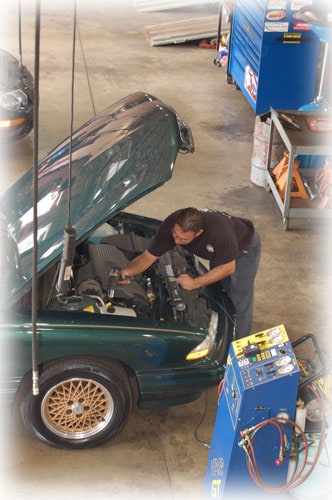16 safety tips for mobile A/C service pros
1. ALWAYS wear eye protection when servicing air conditioning systems or handling refrigerant.
2. Avoid breathing refrigerant and lubricant vapor or mist. Exposure may irritate eyes, nose and throat. If accidental discharge occurs, ventilate the work area.
3. Do not allow refrigerants to come in contact with open flames and high-temperature surfaces. Decomposition is hazardous, and can occur if refrigerant is exposed to high temperatures (open flames, hot metal surfaces, etc.)
4. HFC-134a is not flammable at normal ambient temperatures and atmospheric pressure. However, tests have shown it to be combustible at certain pressures and ambient temperatures when mixed with air under pressure in a sealed environment. Service equipment or vehicle A/C systems should not be pressure tested or leak tested with compressed air.
5. PAG lubricant is hygroscopic (absorbs moisture). Containers must be kept tightly closed.
6. PAG lubricant can be a skin irritant. Protective impervious gloves are required to prevent lubricant contact with the skin. To help avoid skin contact, mineral oil should be used to coat o-rings and seals prior to installation. Also, since PAG lubricants absorb moisture, using mineral oil reduces the potential for fitting corrosion.
7. PAG lubricants can cause damage to paint, plastic parts, engine drive belts and coolant hoses. Care should be taken to prevent PAG lubricants from coming into contact with these items.
8. Failure to follow instructions provided by A/C system service equipment manufacturers could result in personal injury or equipment damage.
9. To prevent refrigerant cross-contamination, use separate service equipment for each refrigerant. Lubricant and refrigerant left in hoses and equipment can be a source of cross-contamination.
10. NEVER transfer refrigerants to a cylinder or tank unless it is Department of Transportation approved for refilling.
DOT approval is indicated by the designation “DOT 4BA” or “DOT 4BW” stamped on a tank’s collar (handle).
11. If a refrigerant tank is overfilled, it may explode. To prevent this from occurring, when transferring refrigerant into a tank, the safe filling level must be controlled by weight, and must not exceed 60% of the tank’s gross weight rating.
12. NEVER perform service on recovery/recycling/recharge equipment (other than routine maintenance) without first consulting authorized service personnel. The removal of internal fittings and filters can cause the escape of refrigerant under pressure.
13. NEVER perform maintenance or service on recovery/recycling/recharge equipment with the unit plugged into electric power unless directed otherwise.
14. Avoid using extension cords with recovery/recycling/recharge equipment. If this is unavoidable, use a minimum length, 3-wire (No. 14 AWG minimum) cord with a ground circuit. To prevent shock hazards and reduce the risk of fire, make sure the extension cord is in good condition (not worn or frayed) with the ground circuit intact.
15. Recovery/recycling/recharge equipment often contains parts that may produce arcs or sparks. Do not use this equipment near flammable liquids or vapors.
16. Fuel injection systems on vehicles contain a service port the same size as one of the CFC-12 A/C system service ports. Be careful not to attach A/C service equipment to a vehicle’s fuel injection system.
Additional health and safety information may be obtained from equipment, refrigerant and lubricant manufacturers.
Refer to their instruction manuals and Material Safety Data Sheets.
Caution: When using recovery/recycling/recharge equipment, while it is very important to follow the general service procedures outlined in this manual, it is also very important to follow your equipment’s manufacturer’s instructions.
Failure to follow these instructions could result in personal injury, damage to the equipment or A/C systems, or improper or inadequate refrigerant recovery, recycling and containment.
When having your mobile A/C system professionally serviced, insist on proper repair procedures and quality replacement parts. Insist on recovery and recycling so that refrigerant can be reused and not released into the atmosphere.
You can E-mail us at macsworldwide@macsw.org or visit http://bit.ly/cf7az8 to find a Mobile Air Conditioning Society repair shop in your area. Visit http://bit.ly/9FxwTh to find out more about your car’s mobile A/C and engine cooling system.
Learn more about the Mobile Air Conditioning Society’s 2011 convention and trade show.

